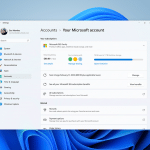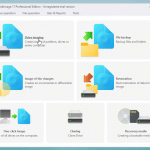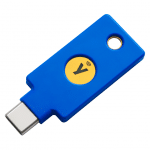Samsung unveils trio of Galaxy Book Windows 11 laptops including 5G convertible model

Samsung hasn't just announced one new Windows 11 laptop, but three of them. A trio of notebooks running Microsoft's latest desktop operating system? How exciting!
Two of these computers are traditional 15.6-inch LED 1080p laptops; one of that pair (Galaxy Book) has a touch-screen display, while the other (Galaxy Book Odyssey) does not. The third model (Galaxy Book Pro 360 5G), is a convertible with a 13.3-inch FHD AMOLED touch-screen that features 5G wireless connectivity.
Microsoft releases Windows 11 Build 22489 with a new Microsoft account settings page

It’s Wednesday, so that (usually) means Microsoft has a new Windows 11 build for Insiders in the Dev Channel.
Build 22489 comes with the standard long list of changes, improvements, fixes, and known issues, but it also introduces with a new settings page for your Microsoft account that displays all of the information related to it that you are likely to need.
Kingston unveils FURY Beast DDR5 RAM

When you are a computer-builder, there are peaks and valleys when it comes to excitement about PC components. What do I mean by this? Well, sometimes you are building machines with cutting edge parts as an early adopter, while other times you are using ho-hum components that have been around a while. For instance, we have been using DDR4 memory for about seven years now... yawn!
Thankfully, the age of DDR5 is finally here. After dealing with DDR4 for so many years now, we will soon see PCs with DDR5 memory inside. One of the companies leading this industry shift is Kingston, and today that company unveils its FURY Beast DDR5 RAM. This memory is designed for use in computers powered by Intel's cutting-edge 12th generation Core processors and Z690 chipset. They should be easy to configure or overclock thanks to Intel XMP 3.0 support.
APIs leave businesses open to attack

APIs are designed to be fast and easy pipelines between different platforms. They offer convenience and user experience which makes APIs essential to many businesses, but it also makes them attractive targets for cybercriminals.
A new report from Akamai, produced in collaboration with Veracode, highlights the frustrating pattern of API vulnerabilities, despite improvements that have been made in software development life cycles (SDLCs) and testing tools.
Microsoft's Tenjin project is a Chromebook rival running Windows 11 SE

Microsoft is said to be working on a new addition to its Surface range, with a new laptop in the pipeline to compete with Chromebooks.
Aimed mainly at the K-12 education sector, the project is codenamed Tenjin and goes hand in hand with a new version of Windows 11. Said to be called Windows 11 SE, the operating system will run on much cheaper and more basic hardware than its big brother.
Revealing the industries most hit by ransomware

New research from cloud encryption specialist NordLocker looks at which industries are the most popular targets for ransomware, analyzing 1,200 companies hit by 10 infamous ransomware gangs in 2020 and 2021.
Perhaps surprisingly the construction sector tops the list with 93 attacks, followed by manufacturing on 86, finance on 69, healthcare on 65, and with education rounding out the top five on 63.
Majority of businesses not protecting their sensitive data in the cloud

The latest cloud security study from Thales shows that 83 percent of businesses are still failing to encrypt half of the sensitive data they store in the cloud.
This is despite the fact that 40 percent of organizations have experienced a cloud-based data breach in the past 12 months.
Microsoft is rolling out the new Windows 11 store app to some Windows 10 users

Microsoft is giving Windows 10 users a taste of Windows 11 by giving them access to the new and updated Store app and the new features it has to offer.
In addition to a whole new look, the new version of the Microsoft Store includes support for Win32 apps as well as Disney+ movies. For now, it is a limited number of users who will have access to the updated store, but it won't be long before everyone with Windows 10 will be able to use it.
Microsoft releases KB5006738 update preview to fix printing problems and more in Windows 10

Ahead of next month's Patch Tuesday, Microsoft has released a preview version of the KB5006738 update for Windows 10.
There's quite a lot to this cumulative update, but what is probably going to be considered the highlight is the fact that it addresses various printer-related issues that have been plaguing Windows users for some time now.
How software engineers can avoid burnout [Q&A]

Managing burnout isn't easy at the best of times, and with the extra stress created by the pandemic, it’s more difficult than ever. With the ubiquitous shift to remote working, people are more isolated and struggling to separate their home lives from work.
Grappling with this 'new normal' has been challenging across the board. For software engineers -- professionals who are historically prone to burnout -- it's been especially hard.
O&O DiskImage 17 Pro unveils Windows 11 support, more VM functionality

Berlin software developer O&O Software GmbH has unveiled its latest major update to its comprehensive Windows backup tool. O&O DiskImage Professional 17.0 provides users with both file-based backup and complete drive imaging for Windows PCs, and this latest release comes with the carpet rolled out for the recently released Windows 11, sporting both full compatibility with the new operating system and a user interface designed to fit seamlessly in with Microsoft’s new design.
The interface refresh -- a common feature for new O&O releases -- opts for colorful icons in place of the minimalist look favored by the previous version. The design and color scheme follows closely the recent design changes in Windows 11 itself.
IObit Driver Booster 9 is Windows 11-ready and packed with problem-fixing additions

Whether you like it or not, and regardless of whether you know anything about them, drivers are absolutely central to Windows. Giving the operating system the ability to communicate with hardware and you the ability to tweak and control settings, drivers are essential for day-to-day computing, and keeping them up to date is important.
Driver updates not only add new features and improve performance, they can also help with stability and security. And this is why IObit Driver Booster is so helpful; it ensures that you always have the very latest drivers installed and fixes a range of driver-related issues. Version 9 of this essential tool has just been released, and it is even more powerful than before.
Yubico launches Security Key C NFC

Earlier this month, Yubico released the long-awaited biometric variant of its popular authentication dongle. Called "Yubikey Bio," it is offered with either USB-A or USB-C connectivity and features a fingerprint reader for enhanced security. Very cool.
While the Yubikey Bio looks like a great product, there is one big problem -- the price. You see, it starts at $80, making it too expensive for many consumers and businesses. Thankfully, today, Yubico launches a much more affordable product, albeit without the fancy biometrics.
COVID-19 boosts digital transformation and continuous intelligence

There aren't many good things to come out of the COVID-19 pandemic, but a new study from Sumo Logic shows that it has accelerated digital transformation and piqued interest in adopting continuous intelligence.
Continuous intelligence (CI) allows real-time analytics to be integrated into business operations. Sumo's study shows that 74 percent of cloud-mature companies recognize the value of providing access to real-time data in this way, while 58 percent of organizations going through cloud transformation agree.
New solution improves visibility and security in the cloud

Enterprises are increasingly turning to the cloud to boost their digital transformation efforts. But they need to address the security needs of this environment to avoid problems caused by breaches, misconfigurations and more.
Zero trust specialist Illumio is launching a new CloudSecure solution to offer organizations agentless visibility and enable teams to build and manage dynamic cloud workload policies using native controls in their public, hybrid, and multi-cloud environments.
Most Commented Stories
© 1998-2025 BetaNews, Inc. All Rights Reserved. About Us - Privacy Policy - Cookie Policy - Sitemap.




